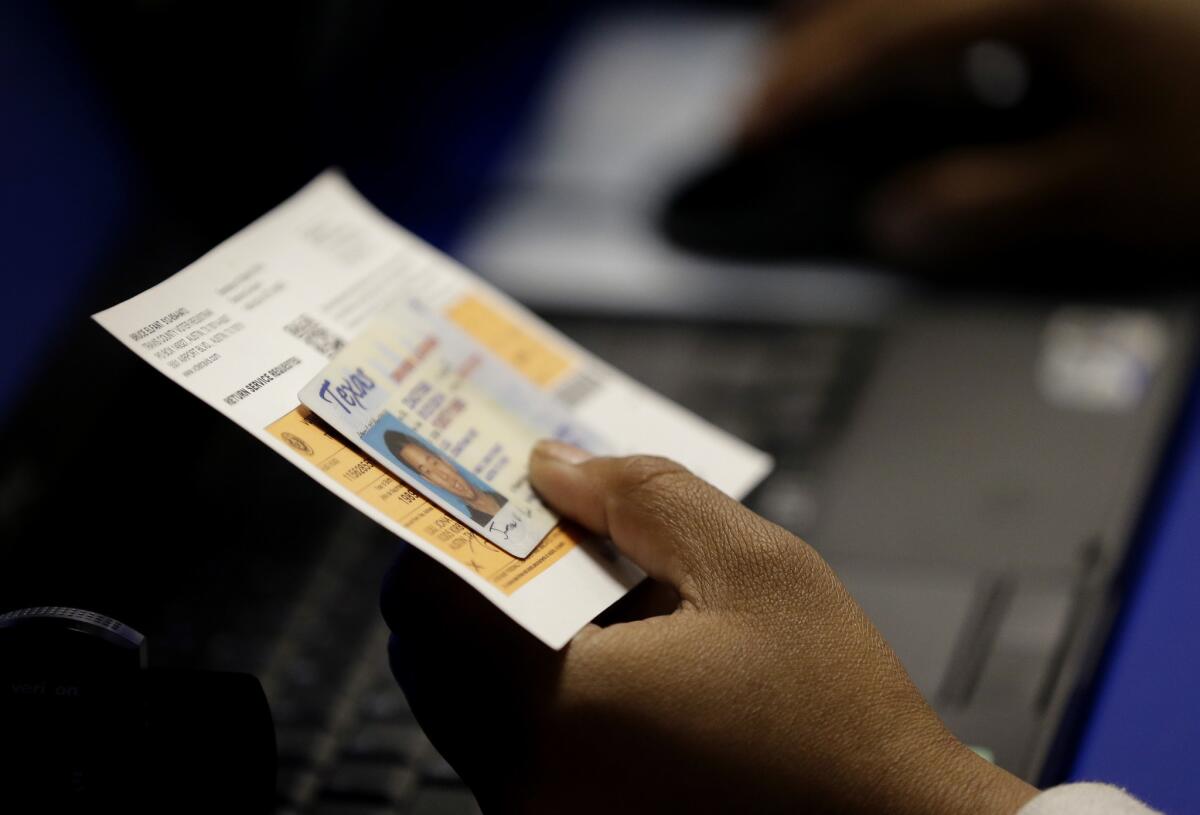Federal judge tosses out Texas voter ID law supported by Trump administration

A federal judge struck down Texas’ controversial voter identification law Wednesday, ruling that it illegally discriminated against Latinos and African Americans. The decision also raised the possibility that the federal government would start overseeing the state’s voting procedures.
U.S. District Judge Nelva Gonzales Ramos of Corpus Christi said the state’s attempts to require voters to present certain forms of identification at polling places — ostensibly to curtail voter fraud — were meant to discriminate against minorities and violated the Constitution and the 1965 Voting Rights Act.
The law, which laid out some of the most restrictive voting rules in the nation, was a revamped version of a 2011 measure that Ramos twice rejected for similar reasons.
The decision Wednesday was hailed by civil rights advocates, who had alleged that the rules were part a broad effort in Republican-controlled states to disenfranchise Latino and African American voters that tend to lean Democratic. Those voters are less likely to have the forms of identification that the law required.
“The judge’s opinion just goes to show that you can’t put a dress on a pig, take it to the ball, and claim that your date is Cinderella,” said Gary Bledsoe, the president of the Texas NAACP, which helped represent the plaintiffs.
Kristen Clarke, president of the Lawyers’ Committee for Civil Rights Under Law, which also joined the lawsuit, said Ramos’ “decision recognizes that a state cannot escape the consequences of its pernicious conduct without completely eliminating all vestiges of discrimination.”
The state of Texas vowed to fight back.
“Today’s ruling is outrageous,” Texas Atty. Gen. Ken Paxton said in a statement announcing plans to take the case to the U.S. 5th Circuit Court of Appeals. “Safeguarding the integrity of elections in Texas is essential to preserving our democracy.”
The decision dealt a blow to Texas lawmakers, who have tried for years to pass voting restrictions only to be repeatedly blocked by courts.
It was also a defeat for the U.S. Department of Justice, which had filed a court brief supporting the voter ID laws in a reversal of its position under the Obama administration.
President Trump, who has launched a federal task force on voting, has asserted without evidence that millions of illegal votes cost him the popular vote in the November election.
The 2011 law required voters to show one of seven kinds of government-issued identification — including a state driver’s or gun license, a passport or military ID — in order to cast ballots.
Ramos ruled against the law in 2014, saying it created “an unconstitutional burden on the right to vote.” The judge cited court testimony that said 600,000 state residents, mostly African Americans, Latinos and those that are poor, did not have the proper ID.
Ramos affirmed the ruling in April after an appeals court ordered her to reconsider whether the law had discriminatory intent.
In May, Texas Gov. Greg Abbott signed a new version of the law that legislators hoped would pass court muster. The law, which was set to go into effect in January, loosened the restrictions by allowing recently expired IDs and letting people without IDs vote by signing an affidavit. It also added voter registration certificates, bank statements and utility bills to the list of acceptable identification.
But opponents said the law still discriminated against minorities and younger voters and complained that it did not allow college IDs to be used.
In Wednesday’s decision, Ramos said that while the new law was an “improvement,” it did not solve the legal issues. The judge left open the possibility that she would require Texas to undergo federal monitoring of its voting procedures.
Jaweed Kaleem is The Times’ national race and justice correspondent. Follow him on Twitter, Facebook and Instagram.
UPDATES:
7:05 p.m.: This article was updated to include interviews with lawyers, context on the history of voter ID laws in Texas, details on the Trump administration’s stance on the case and analysis on voter ID rules.
This article was originally published at 3:40 p.m.
More to Read
Sign up for Essential California
The most important California stories and recommendations in your inbox every morning.
You may occasionally receive promotional content from the Los Angeles Times.











